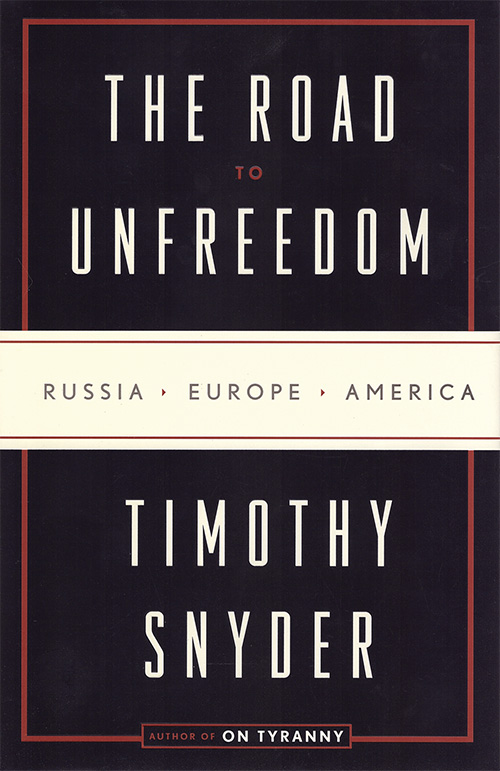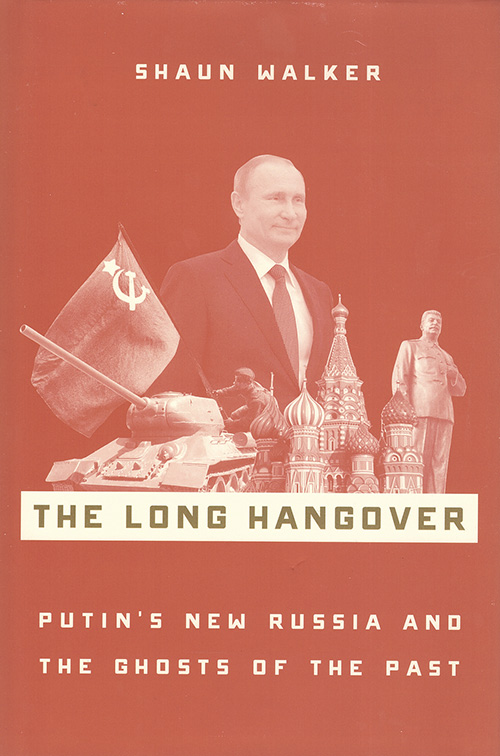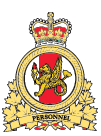Book Review Essay
Weaponizing Unreality
by Sean M. Maloney
For more information on accessing this file, please visit our help page.
Timothy Snyder, The Road to Unfreedom: Russia, Europe, America (Crown Publishing Group, 2018)
Shaun Walker, The Long Hangover: Putin’s Russia and the Ghosts of the Past (Oxford University Press, 2017)
Canada’s latest involvement in the European project entered a new phase with the decision to deploy military forces to Latvia in 2017. One could argue this is an extension of our half-century involvement with NATO during the Cold War, and that the units are descendants of those that composed Canadian Forces Europe during that time. Today, we are confronted with what is, in effect, the same threat: Russia seeking to interfere with, disrupt, and dominate Europe. We are, however, conditioned to view the threat through our traditional lenses, while at the same time, the means by which this interference and domination takes place has itself evolved. It is crucial that the CAF as an institution, at all levels down to our ‘strategic corporals,’ understand the labyrinthine methodology now employed by our adversary. This is no easy task. To assist us, however, we have two valuable allies: historian Timothy Snyder and journalist Shawn Walker. Both have spent significant time in the theatre of operations, and both bring perspectives that are sorely lacking in Canadian discourse, such as it is, on the topic.
In essence, Putin’s Russia employs a new ideology and significantly-evolved influence operations that will appear convoluted, contradictory, and even kaleidoscopic to those in the West who attempt to use traditional political science approaches to understand them. In doing so, the dangers that the new threat pose may be underestimated if their origins and basis are misunderstood. Furthermore this is a multi-generational long game recognized by our adversary, one that is virtually incomprehensible to a Canadian political system and society conditioned to operate on a two-to-four- year horizon, and one with the inability to process historical context. The manipulation of perceptions of history is, in fact, the basis of this new Russian nationalist ideology, as well as a key component of its operational methodology. We must never forget that similar convoluted esoteric ramblings by Adolph Hitler in the 1920s and their wholesale adoption by the most scientifically, technologically, and arguably philosophically-advanced nation of the day brought us into the Second World War and generated the Holocaust. Similarly, the underestimation of Joseph Stalin’s multi-generational Communist project and its esoteric basis by Western diplomats, journalists, and politicians of the day led to the domination and enslavement of Eastern Europe, which was the basis of the Cold War, and our long term involvement in that conflict. If Snyder and Walker are correct, and they are in a position to be correct, we are currently dealing with something that is equally sinister and well advanced.
Snyder’s argument in The Road to Unfreedom is a sophisticated mechanism that defies simplification. For our purposes, the key aspects of it relate to the basis of the new Russian ideology and how it presents itself, both to us in the West, and to Russians themselves. The key theories that inform Putin’s ideology come from three, and to us obscure, Russian sources: Ivan Ilyan, a proponent of Christian fascism in the 1920s; Lev Gumilev, a proponent of Eurasianism in the 1990s; and Alexander Dugin, who is, for want of a better descriptor, a man who employs Eurasian concepts “to make Nazi ideas sound Russian.” While reading Snyder’s attempts to ‘wrap his head’ around the key components of these bizarre views, one cannot escape comparing them the Thule Society and its influence upon Hitler’s esoteric thinking. Gumilev was also a member of the Izbrosk Club, whose members litter the Russian elite, and whose ideology is an extension of these and other theorists operating along similar lines. A TU-95 nuclear bomber of the Russian Air Force was recently dedicated to this organization, with “Izbrosk Club” stenciled on its fuselage.
Holocaust denial is integral to the new ideology. In this view, the Russian people suffered more than did the Jews. There were more dead Russians than Jews. Therefore, the Holocaust is an irrelevant Western construct. The basic idea underpinning the ideology is that ‘Russia the virgin’ is being penetrated by Western ideas and perversion, and in particular, homosexuality, with attendant HIV ‘poison.’ Russia can do no wrong in defending itself against this threat. The Ukraine is Russia. Nazi fascists occupy the Ukraine repressing and raping Russians, and stealing resources. The syllogistic argument that anyone who protests Russian moves in the region is gay, and therefore supports the Nazi agenda to defile Russia was and is employed repeatedly. As absurd as it appears to us, the re-conquest of the Ukraine and the liberation of Europe from what amounts to a “…gay Nazi Jewish international conspiracy, as Russian propaganda suggested to various target audiences,” is, in part, the basis of the present situation. Homophobia and anti-Semitism are central to the ideology.
The Russian propagandists learned in the past that Western media could undermine authoritarian control, so they have deliberately set out to generate as much confusion for their population as possible. The war in Ukraine was equated to the Second World War: “So long as the battle was raging, it was always and forever 1941. During a major incursion in summer 2014, young Russians painted the words FOR STALIN! on their tanks.” Snyder sums up Vladimir Surkov, Putin’s primary ‘political technologist’ (read: Goebbels equivalent): “To end factuality is to begin eternity. If citizens doubt everything, they cannot see alternative models beyond Russia’s borders, cannot carry out sensible discussions about reform, and cannot trust one another enough to organize for political change. A plausible future requires a factual present.” A key aspect of the assault on reason identified by Snyder is that, “The adage that there are two sides to a story makes sense when those who represent each side accept the factuality of the world and interpret the same set of facts.” What if they do not? In effect, “The war [in Ukraine] was not taking place, but were it taking place, America was to be blamed; and since America was a superpower, all was permitted in response to its omnipotent malice. If Russia had invaded, which it was somehow both doing and not doing, Russians would be justified in whatever they were doing and not doing.” Truly mind-bending stuff, but effective as it creeps into Western and even Canadian media. Snyder calls this ‘reverse asymmetry,’ where during the Russian invasion of Ukraine, “…the strong used the weapons of the weak-partisan and terrorist tactics-in order to pretend to be weak.” Chechen and Ossetian battalions were brought in on the pretext they were fighting to defend Russia against the United States. Indeed, Mujahedeen from Chechnya (the Death Battalion) were organized and directed against the Ukrainians in the service of the Orthodox Church, yet another mind-bending move. This is an eternal war, where the West is the eternal enemy, and everything is justifiable. In this world, 2+2 does equal 5.
Moving along, Shaun Walker’s The Long Hangover parallels Snyder’s work. Walker notes that after the collapse of the Soviet Union, “Russians felt they had lost not an empire or an ideology, but the very essence of their identity.” Putin’s “manipulation of history and…aggressive stifling of dissent” was part and parcel of “…the curation of the past in the service of the present; the attempt to meld collective memory of the painful and complicated Soviet decades into something Russians could be proud of.” In doing so, the bizarre contradiction of a Russian fascist state celebrating Soviet Communist victory over fascism in the Second World War becomes more understandable. The new ideology with its appeal to “purity and chastity” was calibrated to meet the expectations of this supposedly-directionless people.
Putin’s view was thus: “…if Russia could regain the global importance the Soviet Union once possessed, then people’s well-being would automatically improve.” By pursuing this line, Walker notes, Putin “tapped into…a political philosophy that fetishized the strength of the state and sovereignty.” The main vehicle for this was a rebranding of The Sacred War [the Great Patriotic War –Ed.] in order to set it marching in the service of the new Russia.
A significant obstacle, however, was the emergence of the post-Cold War historiography whereby the crimes of the Soviet Union against its own population, particularly Ukrainians, became inconvenient, as were things like the Molotov-Ribbentrop Pact, Katyn Forest and other mass murder operations directed against the Poles. Consequently, “…it became ‘unpatriotic’ to dwell on the darker pages of the war,” and “…anyone trying to undermine or complicate the narrative was also attempting to undermine Russia itself.” This led to the 2009 “Commission to Prevent the Falsification of History to the Detriment of Russia’s Interests,” which rewrote narratives about the Baltic States, Ukraine, and Poland to call into question their people’s victim status and indict them as Nazi collaborators. Indeed, any questioning of these new narratives was branded by state-controlled media as the moral, legal, and the functional equivalent of Holocaust denial.
To augment these new narratives, a variety of carefully-written alternative history novels, as well as calibrated pseudo-history books flooded the Russian market (including novels depicting the invasion of the Ukraine as early as 2005). Walker details the deliberate distortion of history in Chechnya whereby the wartime Chechen deportations are being erased from history by a former anti-Russian mujahedeen who controls the country as an extension of the Kremlin’s will: “Chechens were required to recalibrate their memories of the past, and tolerate Kadyrov’s personality cult.” Those who dissented were labeled gay and rounded up.
Walker cogently compares the 2012 Sochi Olympic Games to the 1936 Olympic Games in Berlin. They were employed by the Kremlin for “internal consolidation,” while the state-controlled media deflected any doping scandal criticism as “…part of a sinister plot, dictated by the West determined not to allow Russia to have its moment in the spotlight.”
The Ukrainians, however, were not interested in going along with the program. Because they did not want to be part of a Russian-controlled sphere of influence, complex matters from the Second World War were activated as part of the effort to ‘prove’ the current anti-Russian Ukraine was an extension of Nazi policy from the 1940s, and thus, it was justifiable to intervene in Crimea and Donbass to protect Russians from pedophilic rape, gays, and HIV. If the Holodomor in the 1930s did not happen, then Ukrainians fighting the Soviet Union in the 1940s had no justification for doing so, and thus they were fascists. The same went for the Baltic States. The historical facts of these states being caught at the time between two totalitarian states and being forced to choose one or the other to survive after being victimized by both, of course, was and remains lost in the discourse.
According to Walker, and on the same track as Snyder, the argument that Canada is protecting a fascist Latvian state that is merely an extension of National Socialist Germany, for example, has already been employed against Canadian troops. The victimization of Latvia by the Soviet Union is not discussed, and Canada’s efforts against National Socialist Germany ignored. Incidentally, NATO’s and thus Canada’s intervention in Kosovo to stop genocide in 1999 is now used as justification for Russian intervention in the region. Again, the historical facts do not matter to those supportive of the Kremlin’s efforts.
Russia’s agenda is advanced and they have made significant progress. If we cannot agree upon what constitutes the threat, we cannot program an effective response to it. The current leadership in the Kremlin understands this and has done everything it can to confuse the issues, as well as to generate disruption and uncertainty at every opportunity. It is absolutely crucial that we ‘pull the curtain aside’ and discern the true objectives and the mechanisms by which Putin’s Russia is using to pursue them. Snyder and Walker would agree that we can only do so by having a firm understanding of the history of the region before we can confront and undermine those efforts.
Sean Maloney, Ph.D, is a Professor of History at the Royal Military College of Canada, and he served as the Historical Advisor to the Chief of the Land Staff during the war in Afghanistan. Dr. Maloney has extensive field experience in the Balkans, particularly in Croatia, Bosnia, Kosovo and Macedonia from 1995 to 2001. He has also authored numerous books on the Cold War.









